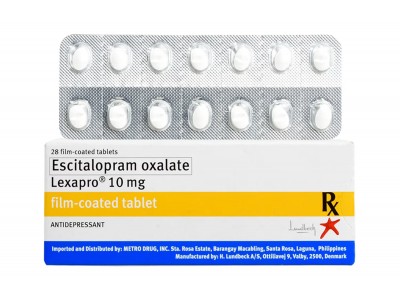Lexapro (escitalopram) and Zoloft (sertraline) are both selective serotonin reuptake inhibitors (SSRIs) used to treat depression and anxiety disorders. While they share a similar mechanism of action, they have some differences in their specific uses, efficacy, side effects, and interactions.
Differences:
Chemical Composition:
- Lexapro is the brand name for escitalopram, which is the S-enantiomer of citalopram. It is considered more potent and selective.
- Zoloft is the brand name for sertraline.
Indications:
- Lexapro is approved for major depressive disorder (MDD) and generalized anxiety disorder (GAD).
- Zoloft is approved for MDD, obsessive-compulsive disorder (OCD), panic disorder, post-traumatic stress disorder (PTSD), social anxiety disorder (SAD), and premenstrual dysphoric disorder (PMDD).
Onset of Action:
- Both medications typically take several weeks to show full effects, but individual response times can vary.
Dosing:
- Lexapro usually starts at 10 mg per day, potentially increasing to 20 mg.
- Zoloft usually starts at 50 mg per day, potentially increasing to 200 mg depending on the condition being treated.
Side Effects:
Common Side Effects (both medications):
- Nausea
- Insomnia or drowsiness
- Dry mouth
- Diarrhea
- Increased sweating
- Sexual dysfunction (decreased libido, difficulty achieving orgasm, erectile dysfunction)
Lexapro-specific Side Effects:
- Headache
- Fatigue
- Increased risk of weight gain
- Some patients may experience more gastrointestinal disturbances like nausea and constipation.
Zoloft-specific Side Effects:
- May cause more gastrointestinal issues such as diarrhea and upset stomach.
- Potential for increased agitation or nervousness, especially at the start of treatment.
- Can cause weight changes (both gain and loss).
Considerations:
Drug Interactions: Both medications can interact with other drugs that affect serotonin levels, increasing the risk of serotonin syndrome. They can also interact with medications affecting liver enzymes (particularly cytochrome P450 enzymes), impacting their metabolism.
Withdrawal: Both medications can cause withdrawal symptoms if discontinued abruptly. These may include dizziness, tingling sensations, fatigue, vivid dreams, irritability, or poor mood.
Pregnancy and Breastfeeding: Both medications are generally considered safe during pregnancy and breastfeeding, but it's important to discuss with a healthcare provider to weigh the risks and benefits.
Effectiveness:
Both Lexapro and Zoloft are effective for their indicated uses, but individual responses can vary. Some patients may respond better to one medication over the other based on their specific symptoms, side effect profile, and personal medical history.
Conclusion:
Choosing between Lexapro and Zoloft should be based on a comprehensive evaluation by a healthcare provider, considering the specific condition being treated, individual response to medication, side effect profiles, and any other underlying health issues or medications being taken. Regular follow-up is important to monitor effectiveness and manage any side effects.

